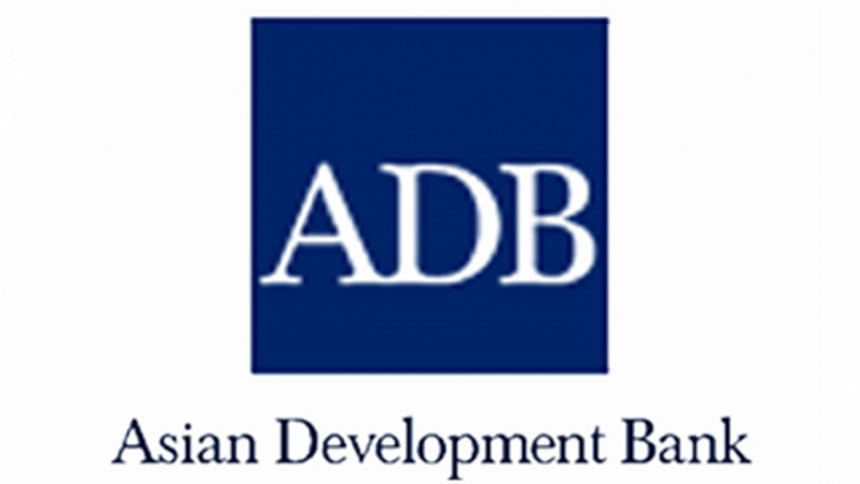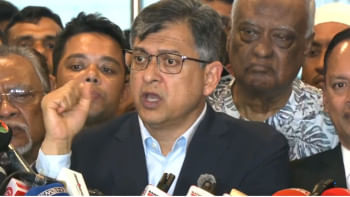Lightning arresters can save lives in Bangladesh: ADB

Lightning arresters, a low-cost technology, can be adopted all over the country to save lives and stop undue human damages from lightning strikes, says the Asian Development Bank (ADB).
"Its use in different parts of the country can save human lives. It's a low-cost technology," ADB Country Director Manmohan Parkash told UNB after handing over seven types of completed subprojects for use under the Emergency Assistance Project.
The ADB Country Director handed over the facilities to LGRD Senior Secretary SM Ghulam Farooque on Friday, which were completed with grant assistance from the ADB.
At least 600,000 "displaced people" sheltered in Cox's Bazar Rohingya camps and the host community will be benefited under the Emergency Assistance Project, says the Bank.
Parkash said lightning arresters are used in many countries to make sure when lightning strikes it goes down to earth so that people do not lose their lives. "So, we've included it as part of our project here (camps)."
The ADB Country Director said they will be more than happy to take it up for the country if they are requested.
According to reports carried by different national dailies on lightning incidents, over 200 people were killed and scores of others injured in lightning strikes at different parts of the country, mainly in central and northern parts, over the last two and a half months from March to May 17 in 2018, showing an increased frequency in lightning strikes.
Responding to a question, Parkash said the needs in Cox's Bazar camps are "enormous" and the ADB is trying to help to the extent it is possible for them.
"We should be working together with all the development partners. The government of Bangladesh has contributed quite a lot. This is a team effort and we work together with our partners as well as the government of Bangladesh," he said adding that their efforts will benefit both the displaced people and host community equally.
Secretary Ghulam Farooque, on behalf of LGRD Minister Md Tazul Islam MP, inaugurated the subprojects, which include 100 bathing facilities; one piped-water supply system; and 200 lightning arrestors.
He also inaugurated the groundbreaking of seven food distribution centers, and 10 cyclone shelters in and around the Cox's Bazar camps.
While inaugurating the facilities, Ghulam Farooque appreciated ADB's grant assistance and speedy completion of the projects.
"I'm happy to see the rapid and impressive implementation progress of the project in less than one year after its approval," said Country Director Parkash.
"The inauguration of subprojects reflects a high-level of government commitment in implementing the project," he added.
After a request by the government of Bangladesh, the ADB approved a grant of $100 million in July 2018 as the first phase of a total possible support of $200 million to develop basic infrastructures and services for displaced persons in the camps in Cox's Bazar.
The grant project is focusing on water supply and sanitation, disaster risk management, energy, and roads in and around the camps, says the ADB mentioning that it is being implemented in close coordination with several development partners.
The water supply and sanitation component ($35 million) will develop 40 mini-piped water supply systems, 500 community bathing facilities, 7 emergency mobile water carriers, 4 drilling rigs for installation of production wells, 3 surface water treatment plants, 3 integrated waste management systems, and 30 waste management vehicles.
The disaster risk management component ($30 million) will construct 10 multipurpose cyclone shelters, seven food distribution centres, 5-km hill-slope protection and 15-km storm water drainage.
The energy component ($8 million) will install 2,000 solar photovoltaic (PV) street lights; 50 solar PV nano-grid systems; 200 lightning arresters; 33/11 KV and 10 MVA sub-stations; 50 km 11 KV distribution line; 2,000 new mini-grid connected street lights and 2,000 new standalone solar LED lights.
Under the road component ($27 million), 50 km road from Cox's Bazar to Teknaf will be resurfaced, 30 km internal and rural roads will be constructed, and 30 km access and link roads will be developed.
The Country Director said 30 kilometres of road will be constructed within the camps so that people can roam around in addition to improving the drainage system.
A site office for the Emergency Assistance Project was inaugurated in the UNHCR premises in Cox's Bazar on February 14 to expedite the ground-level project implementation activities.

 For all latest news, follow The Daily Star's Google News channel.
For all latest news, follow The Daily Star's Google News channel. 







Comments